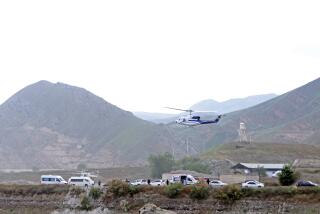Soldiers Face Extended Tours of Duty
The U.S. Army, facing unprecedented turmoil in its ranks as a result of Operation Desert Shield, has proposed to halt the departure of soldiers who have fulfilled their terms of service or chosen to retire, Pentagon officials said Thursday.
The recommendation, which the Army is to present today to Defense Secretary Dick Cheney for approval, is intended to shore up Army forces at a time when 40% of the troops are either in the Middle East or bound for the region.
The move comes less than two weeks after the Pentagon announced that it would dispatch as many as 200,000 new troops to the Persian Gulf, where 240,000 already are in place. As Iraqi President Saddam Hussein has threatened to increase his forces in Kuwait, Pentagon officials have refused to rule out further American deployments in response.
If approved as expected, the Army proposal would extend the tours of duty of roughly 3,500 officers and recruits per month.
In a move that could affect several thousand more soldiers, the Army proposed to call off its traditional two-week holiday break in training at the end of December and to freeze the transfer of soldiers from overseas assignments to bases in the United States.
The measures are the most dramatic indication to date of the difficulty the Army is having managing a massive deployment of troops at the same time that it had planned a major reduction in the size of the force. “This would allow us to sustain the force properly in Saudi Arabia and to stabilize everywhere else, where turmoil has been significant,” one Pentagon official said.
The apparently conflicting objectives have prompted Army and Pentagon officials to rethink plans to shrink U.S. military rolls by 25% over the next five years.
Among those who manage the military services’ manpower policies, the turmoil resulting from Operation Desert Shield is causing concern that potential new recruits will shy away from military service and that those already in the service will leave in droves once they are free to go.
The package to be presented to Cheney would extend a policy called “stop-loss,” under which the Army already has held more than 5,600 soldiers in the service against their wishes. To date, that policy has affected only soldiers in or bound for Saudi Arabia and others whose military jobs could be crucial to the deployment.
The Air Force, Navy and Marines have not yet used the authority, given the Defense Department in 1983 but never before used, to keep recruits and officers in the service against their wishes. But defense officials said all were considering some limited application of the policy as a result of Desert Shield.
The latest proposal, which would take effect Dec. 1, would extend the tours of virtually all of the Army’s 732,403 officers and recruits. It is certain to disrupt the plans of thousands of GIs who, fearing layoffs by the military, had planned to leave the service and find jobs in the civilian economy.
As a result, the move is bound to raise concerns that the allures of military life will dim in the eyes of American servicemen and women, as well as of prospective military recruits. The result could affect for years the military’s ability to draw qualified volunteers to fill its ranks.
For example, Specialist David Gass, a computer programming analyst in the Army’s Information Systems Command at the Pentagon, gets out of the military today, and he says that Operation Desert Shield is going to have to proceed without him.
Gass has plenty to be thankful for--at least he is not one of the more than 5,600 whose tours of duty have been extended against their wishes. But the massive U.S. deployment to the Middle East nevertheless has shaken his faith in the benefits of the military life.
As a result of what he’s seen in the ranks lately, Gass has decided that at the end of his hitch, he probably will not even join the Army reserves, which recruits heavily among military departees. It no longer is the safe “weekend warrior” stint it once appeared to be, he said.
“I had pretty much made up my mind to join, and this (Operation Desert Shield) has really stopped me,” said Gass. “Until all these reserve callups, it was just a matter of extra money and a chance to still be involved with the military, at less than full-time. Now, it’s just not worth the risk anymore.”
Gass is representative of a larger trend that is already stirring concern among military manpower experts at the Pentagon and elsewhere. Desert Shield has dramatically illustrated the hardships and uncertainties of military life, and there are early signs that the massive deployment has discouraged many young American men and women from joining and staying in the U.S. military.
Even for a force slated to shrink with the decline of East-West tensions, Desert Shield could have a long-term effect on the military’s ability to compete in tomorrow’s marketplace.
By October, the Mideast deployment had reduced by almost 30% the numbers of qualified recruits volunteering for military service, according to one internal Army estimate. And November’s recruitment figures are expected to bring even gloomier news about the impact of Desert Shield on the future of the volunteer force.
Operation Desert Shield “is the only thing that could effect such a drastic change,” said one military manpower specialist. “You are less likely to go into the Army when a nasty war may be coming up.”
The analyst added that news of the Pentagon’s enforced tour-extensions also has undermined recruits’ faith in the military’s word.
“We tell recruits they can come in for two years, and people are reading that some of these young soldiers are being extended involuntarily,” said the manpower specialist.
More troubling over the long term is that Operation Desert Shield has wreaked havoc with some of the military’s most effective recruitment pitches.
“What we’re selling is benefits: We never tell potential soldiers that they’re joining to fight for their country or to protect freedom, but to cash in on some benefits,” the analyst said. “It’s going to make sense that when people discover that when it’s not all benefits but some substantial discomfort, their interest will drop.”
The lure of education and skilled training benefits in the military have consistently drawn the highest percentage of new recruits, while service to country was cited by only about 10% of those joining the military.
If the decreases in qualified volunteers continue as expected, the military services will have to lower their standards for new recruits or devote much more money and effort to recruitment and education benefits in order to attract the numbers of new troops they believe they need.
Among those already in the military, the effects of Operation Desert Shield are less clear. Many believe that when U.S. troops return, there will be a mass exodus among those drawn to the service by its promise of security and benefits but sent to Desert Shield instead.
But other experts said that for now, the problem may be one of getting rid of the troops when they come back. Many officers and recruits who felt vulnerable to layoffs just four months ago have regained hope that they will be permitted to stay, they said.
“There are a lot of people who are thinking, ‘Maybe they’ll keep me around,’ ” said William G. Fitzpatrick, an executive of the Non-Commissioned Officers Assn. who counsels military professionals on making the transition to the civilian world. “There’s not the sense of vulnerability, of impending doom. It’s more a sense that maybe this downsizing business is going to go away.”
For many combat soldiers, the Saudi deployment has forestalled a difficult but inevitable transition to civilian life, said Thomas E. Collins, an assistant secretary of labor responsible for veterans’ employment and training.
“The realities of the situation have not changed that much: There will still in the long run be a downsizing of the military,” said Collins. “The combat arms folks are the people I’m concerned about. They’re the ones with the least ability to make the transition to a lot of jobs.”
With their post-military planning on hold right now, Collins added, some will be at an even greater disadvantage.
In the final analysis, Operation Desert Shield’s recruitment fallout may affect the nation’s National Guard and reserve force most deeply. If prospective citizen-soldiers stay away in droves, experts said the military’s “total force concept,” the heavy reliance on Guard and reserve units in any major deployment, could be called into question.
“The big pressure will be when the reservists go home,” said Charles Moscos, a military sociologist at Northwestern University in Illinois. “For many of them, this has been a jarring experience: They’ve had to leave jobs. How reserve retention will come out after they’re deployed home will be the big question. It could be the Achilles’ heel in the total force concept.”
More to Read
Start your day right
Sign up for Essential California for news, features and recommendations from the L.A. Times and beyond in your inbox six days a week.
You may occasionally receive promotional content from the Los Angeles Times.







